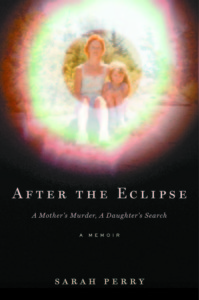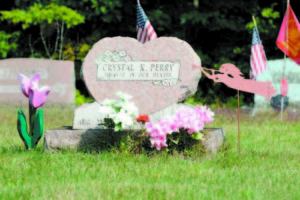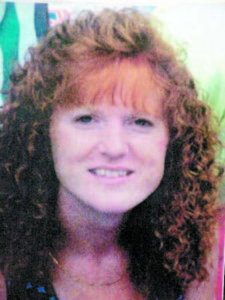‘I need to tell this story’ — Author Sarah Perry returns to Bridgton for book signing
By Wayne E. Rivet
Staff Writer
She was just 12 years old when her sleep was broken on a misty May night to the sound of a heated argument, and then the unforgettable, “No!â€
Minutes later, the little girl bravely opened her bedroom door and found her mother on the floor. She did not move. There was blood, everywhere.
Desperate to help her mother, the little girl ran nearly a mile barefoot, in the rain, in complete darkness, stopping at three homes only to be ignored. Finally, she found safety at a restaurant, and police were notified.
It was 1994. Bridgton awoke that morning to the startling news that a young woman — Crystal Perry — had been stabbed to death inside her Sweden Road ranch home.

Â
After the Eclipse: A Mother’s Murder, A Daughter’s Search
347 pages
Publication date: Sept. 26, 2017
Sarah’s visit to Bridgton
Author Sarah Perry will read portions of her memoir and hold a question-answer session on Wednesday, Oct. 18 at the Magic Lantern Theater in Bridgton at 6 p.m. Doors open at 5 p.m.
Copies of the book can be purchased at Bridgton Books (Main Street) for $27 plus tax, which entitles the buyer to attend Perry’s talk and have their book signed. Space at the Magic Lantern is limited, so purchase your copy as soon as possible.
What some reviewers’ said…
• Sarah Perry does a remarkable job recounting the harrowing tale of her mother’s murder and the long wait to find her killer. It is obvious this book has been thoroughly researched and painstakingly recounted, and while Sarah’s love for her mother clearly comes through, she does not let it alter the facts of the case. This is an important book that reminds the reader that social class, race, or gender should never affect how a crime is portrayed or perceived, and how each violent crime we read or hear about as we quickly swipe or turn the channel, has impacted and changed someone’s life forever.
• This book is just incredible. It’s a true crime mystery without any sensationalism. It's a memoir about a woman whose mother was murdered at 30, while she was in another room of the house, and how that event shaped the author’s life. She was orphaned at 12, and didn’t find out who killed her mother for 12 more years.
But at it’s core, it’s about family, and identity. It’s a memoir about figuring out who you are in the wake of devastating grief without the one person who's been there your whole life; it’s about understanding who your mother was as a woman, not just a mother; it’s about the people who come and go in your life, and who you do or don’t trust, and who remains; it’s about how, for better or worse, family helps define who you are.
The writing itself is gorgeous. That the events in this book actually happened is heartbreaking, and Perry’s account of it is powerful. The storyline not only relies on the author's memory, but on interviews with family and friends, research, and police documentation. She often says throughout the piece that this is her truth, and will explain when other people have remembered slightly differently than her.
• It’s easy, as a reader, to think “this is an event that happened, once, a long time ago,†but for Sarah, it’s every day of her life, and she brings that idea to the forefront. Her memoir is courageous, it’s honest, and never indulges in self-pity.
I appreciated Sarah’s candor. She acknowledges her faults, the mistakes all of us make as adolescents. She allows herself room to ask questions, to wonder about her mother’s motivations, the relationships she maintained with men and with her friends. She wonders about the fallacy of memory and about the unreliability of what you think you know about those close to you. The research is impeccable. Sarah refers to police transcripts, interviews, and personal remembrances, but this never reads like a sterile report; it’s like sitting with your best friend and listening to her tell you her story.
Excerpts from the book
• My mother was full of energy and passion. She believed in the souls of housecats and in the melancholy of rainy days. She believed in hard work, and the energy she poured into her job — hand-sewing shoes at a factory — seemed boundless. She believed in spontaneity…She was graced with bright red hair, a golden tone of red I’ve seen only a handful of times. As a child, I never tugged on the wrong coat sleeve in the grocery store, I never wandered away and got lost; I just kept that bright hair in sight.
• The night…I’ve been sleeping for hours, curled on my side and wedged among my many stuffed animals…The stillness is shattered by my mother screaming, “No! No! No!†Over and over and over….I’m frozen bolt upright, palms flat beside my thighs, fingers clenching the sheets tighter and tighter as my mother continues to scream. She’s so loud it’s inside my every cell, so loud her screams turn the wall beside my bed to paper….We are maybe fifteen feet away from each other…My partially open door lets in faint orange light from the kitchen…I can only see down the hall, away from the screaming. I cannot risk opening the door farther and peering around to see what is happening. I don’t need to see. I need to survive…Mom is still screaming, “No!†I can think of nothing to do but wait, silently, and strain to piece sound into meaning…Impossibly, her screaming gets louder. In that scream, I hear absolute terror, terror I didn’t even know existed…Blood on the floor…blood on the chair…more pools and splatters, too many for me to take in…Her body is lying in front of the door…She is still.
• For the rest of my life, people will assume that my youth somehow wiped out the memory of the murder. It’s a thought they use to console themselves, not me. The thudding and the blood and the run along the road will always be sharp and clear.
• Although I feared Maine and did not want to return (while living in Texas as a teen), I still considered it home, and would sometimes think wistfully of the tall pines that I’d left…Connection to Bridgton had to be on my terms. My former home had become a place I could barely look at on a map.
• This story will never be over. I could make calls and conduct interviews forever…I will never know exactly how and why we lost her: it is a puzzle I cannot solve, and even (Michael) Hutchinson probably doesn’t know the answer. I’ve had to find my own ending, decide for myself when to move on.
• As many times as I’ve tried to remember, I have never been able to recall the hours before Mom and I went to bed that final night. They’re completely gone, wiped out by the violence that followed…My memory will not bring that evening back to me; imagination must suffice…Mom smiles when she peeks her head around the door frame and says, “All ready?†I say, “Yeah!†and she comes to my bed. When she leans over to kiss my forehead, I see her freckled breastbone through a gap in the robe, and her hair makes a bright cave around me. She smells of vanilla perfume. We say I love you. We don’t know to say good-bye.
Immediately, questions swirled. But, the one question that would baffle investigators for over a decade was, “Who could have committed such a heinous act?â€
Ultimately, the murderer was identified — Michael Hutchinson, a local man who continued to live in Bridgton for 12 years. He is now serving a life sentence.
Whatever happened to the little girl — Crystal’s daughter, Sarah?
Today, Sarah is 35 years old. This week, she saw a seven-year project become a reality — the public release of her book, After the Eclipse: A Mother’s Murder, A Daughter’s Search.
To mark the release of the book, Sarah will return to Bridgton on Wednesday, Oct. 18 to hold a special book signing, as well as a reading and Q&A session at the Magic Lantern.
While the conviction of Michael Hutchinson answered one question, Sarah discovered she had many more questions regarding her mother’s life, not just those final horrific hours. With her mother gone, Sarah sought to piece together through interviews with friends and family members just who Crystal was. The picture wasn’t always pretty. Crystal had a difficult upbringing, yet always dreamed of finding a true love. Several personal relationships were marred by heated arguments and failed, but Crystal — who worked at the Sebago Moc plant, which was on the site of the current Hannaford grocery store — always remained upbeat and determined to carve out a better life for herself and her young daughter, Sarah.
Two days before Crystal was murdered, Sarah saw a partial eclipse of the sun. She thought it was a sign of good things to come for her and her mother. Instead, the wish for a better life was silenced when a stranger to Sarah entered the Route 93 home and stole her mother’s life.
Sarah’s dream was to become a writer.
“While growing up in Bridgton, I had dreams of becoming a writer. The Bridgton Library was a great resource, and my teachers were really supportive and encouraged me to write stories. And we had Stephen King nearby, so I had some idea of what it meant to be a published writer. That dream was disrupted by Mom’s death; imagination was no longer fun or safe,†wrote Sarah in an e-mail interview with The News. “But eventually, after the trial, I knew I needed to tell this story. It was the story that I was compelled to tell before I could work on anything else. I wanted to create a memorial for Mom — something that focused on her life as much as (if not more than) her tragic death. I also wanted to make connections between everyday sexism and aggression and the more extreme violence that many women face. If we don’t eradicate this idea that women are less important than men, that they don’t have a right to their own bodies, these crimes will never stop happening.â€
Sarah earned a master’s degree in nonfiction from Columbia University and received two notable writers’ fellowships. She now resides in Brooklyn, N.Y. and graciously answered the following questions posed by The News (these questions were sent prior to the BN having the opportunity to read the advanced reading copy sent to the newspaper):
BN: What led you to pursue a career as a writer?
Sarah: From a very early age, I loved reading. It’s important to read as much as possible if you want to be a writer. Stories can serve not only as entertainment, but as tools for empathy and understanding. I wanted to harness that power. I also just always loved language — the pleasure of manipulating words, sentence structure and rhythm, and other craft elements to achieve different effects.
BN: For those residents here in Bridgton and the Lake Region area that only remember you as a little girl, who tragically lost her mother, speak of some of the difficulties and challenges you faced growing up and how you overcame them?
Sarah: There’s a lot more about this in the book, but something that was particularly hard in the years after Mom’s death was a sense of alienation. I felt isolated from those around me, especially fellow students at school. If I tried to talk about Mom and her death, people were often shocked into silence. Or, they would say insensitive things because they couldn’t incorporate this dramatic fact into their reality. I learned to seek out people who could handle hearing uncomfortable truths, who wouldn’t feel repelled by or scared of me because I had gone through this terrible thing.
This has been true all my life, but was especially important when I was younger. Often, these people had been through challenges of their own, and we helped each other. I have a very strong “chosen family†of close friends who provide a lot of emotional support. I also have a few aunts — my mother’s sisters — who’ve loved me well. And I got a lot of validation out of being a good student. I had many teachers who were invested in me. Furthering my education (through scholarship and loans) made me stronger and more confident and able to access advantages that Mom didn’t have when she was a young person.
One thing that’s hard about losing one’s mother, especially if you were born an only child, is that you no longer have anyone in the world for whom you are the most important person. You might have partners or best friends or relatives, but you can’t take it for granted that you will be #1. So you have to be a bit strategic; make sure that you build a strong support network of people who really care about you, so that if you’re going through a hard time, there’s more than one person to call. But this brings the advantage of making you seek out more love, both to give and to receive.
BN: How would you describe yourself today, and what goals have you set for yourself?
Sarah: I’m a pretty positive person, although I do have a tendency to worry about the future. Mom’s death was so sudden and shocking, and happened at such an impressionable age for me, I think I will always be sort of looking over my shoulder, trying to be prepared for the worst. On the other hand, she taught me to embrace joy, even in tough times, so that’s a big value for me. She had her own challenges and worries, but she was so charismatic and fun, and appreciated the little things. I try always to live with gratitude, to extend love where I can and to enjoy life. I think people often find me to be much less serious than they expect, if they know my story before they meet me. I want to continue to have adventures and take risks; to travel and to meet new people. I want to write another book within the next five years. I have a few ideas that I’m exploring, but nothing definite that I can share yet.
BN: Have your returned to Bridgton recently?
Sarah: I’ve been writing the book since 2010, and I put a lot of research into it, so over these past seven years, I’ve been to Bridgton a few times. I’ve conducted some interviews and visited Mom’s grave and driven past my old house. I’ve driven around and just thought about things, seen old landmarks, letting old memories and feelings come to me. I have also sometimes tried to make it fun. I brought a New York friend to the drive-in! He’d never been to one, and we had a blast. I hadn’t been in town in some time, and was nervous that the drive-in, which I’d so loved growing up, would be gone. And then I discovered that it had doubled in size! Even the smallest changes in town are jarring to me. Bridgton has a McDonald’s? What world are we living in?
On a more serious note, being in Bridgton is complicated for me. It’s strange to know that a lot of people in town remember Mom’s death, and if I’m walking around downtown, I get worried that someone from my past will recognize me, but because I was a kid and this happened so long ago, I won’t remember them. On the other hand, I live in New York City now, so I’ve arguably become a sort of Summer Person, and that’s very strange for me. And even if it’s illogical, there is always a shadow of fear, and certainly one of sadness. I’m not very comfortable being in town for very long, or at night. That probably won’t ever change, but I have gotten better at enjoying Bridgton, too. I love going into Renys, because even though it’s so different than it was when I was a kid, somehow it smells exactly the same.
BN: Have you ever confronted Michael Hutchinson?
Sarah: I have not spoken with Michael Hutchinson. I don’t think that would be a very useful exercise.
BN: What are your fondest memories of your mother?
Sarah: There are so many (many are in the book!). She loved the beach, so I have a lot of good memories of going to Salmon Point on Long Lake, and driving to Old Orchard Beach (and riding that old carousel!). We went to the old Magic Lantern as often as we could, and sometimes we’d go to the Planetarium in Portland. She was always curious about things and wanted to expose me to new experiences, but she was also just good at making everyday activities fun. We’d go on long Sunday drives and listen to WBLM. She’d let me hang out with her on the porch while she waxed her strings for handsewing at the Shoe Shop.
Once, when we were living in North Bridgton with my grandmother, some teenagers smashed a huge Jack O’Lantern we’d carved together. She was so mad about it that she wrote a letter to The Bridgton News, calling them out. And you guys actually printed it!
BN: What were the biggest challenges writing the book? What was your approach, how long did it take to write, and who were your biggest resources/help?
Sarah: There were so many challenges. On a technical level, the book covers a lot of time — from Mom’s childhood in the 1960s up through almost the present day. I had to figure out what to put in and what to leave out. I wanted to include other people’s experience of Mom’s death, rather than only my own, so that gave me even more material. I wrote A LOT — I ended up cutting as many words out of the book as are in it.

FINAL RESTING PLACE for Crystal Perry is the North Bridgton cemetery. When it came time to choose a headstone, Sarah’s aunts decided upon the above pink headstone. Sarah considered the choice too sentimental and pretty. “The pink heart was meant for a calmer death, someone who had wasted away with a chronic disease or died of old age, someone who had time to say good-bye….I didn’t want everything to be dressed up and made pretty. If I’d had my choice, the stone would have been hard and dark like the death; an angular chunk of polished black marble or a tall, sharp obelisk piercing the sky. I hated the idea of an unassuming pink thing sitting in a line with all of the other stones — well behaved, decorative. Undistinguished.â€
Although I’d done some work on the book in the couple years after the trial in 2007, I really began it in the fall of 2010. I finished this past February, so it took over six years. For the first year or two, I would tackle whatever part of the story I found most interesting, or that I could handle psychologically and emotionally. So it was written very out of order. At some point, I had 187 Word files with book material. Then, I collated all of that chronologically, rearranged that into several different structures before arriving at the current braided timeline.
On an emotional level, writing the book was very difficult. I had to really sit with a lot of sad and scary things, and examine them more closely than I ever had before. I had a habit of getting into “journalist†mode, really digging deeply into something, and then realizing a little too late that I was feeling overwhelmed. As the years went on, I got better about that. I got kinder to myself, took more breaks. I’d set up nice rewards for myself when I completed difficult tasks, and I’d call on fellow writer friends to talk things through.
I made many research trips to Maine, accessing police records and interviewing my family and Mom’s friends, as well as police officers and other people who worked on the case. The Maine State Attorney General’s Office, particularly former Victim Witness Advocate Susie Miller and current Criminal Division Chief Lisa Marchese (the lead prosecutor in Mom’s case) were incredibly helpful, both in enabling me to access records and answering my questions. The Maine State Police and the Bridgton Police were also really wonderful, particularly Commander Walter Grzyb and Lieutenant Peter Madura. Former Bridgton News reporter Lisa Ackley was also so informative and touching to speak with. I’m so grateful to everyone who agreed to speak to me in the making of this book; I wish I could list them all here! I’m especially grateful to Dennis Lorrain (one of Crystal’s former boyfriends), who’s been through so much in this story and was so open and honest.
BN: What do you like most about the book?
Sarah: One of my main goals was to make the book as much about Mom’s life as about her death, to make her a real person on the page and not just a victim. I think I managed to do that. I’ve also heard from a lot of readers that the book has made them think about some of the broader social issues that contribute to crimes like this, so that’s very satisfying to me. I would like this book to contribute to positive change, not just be a sad story.
Now, the little girl returns home Oct. 18 as an accomplished writer ready to tell her story.



